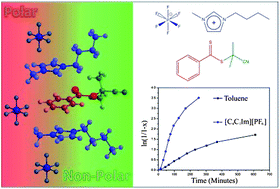The influence of domain segregation in ionic liquids upon controlled polymerisation mechanisms: RAFT polymerisation†
Abstract
Recent evidence has suggested that the

* Corresponding authors
a
School of Chemistry, The University of Nottingham, Nottingham, UK
E-mail:
peter.licence@nottingham.ac.uk
b Department of Chemical and Environmental Engineering, Faculty of Engineering, The University of Nottingham, Nottingham, UK
c
Australian Institute for Bioengineering and Nanotechnology, The University of Queensland, St Lucia, QLD, Australia
E-mail:
k.thurecht@uq.edu.au
d Centre for Advanced Imaging, The University of Queensland, St Lucia, QLD, Australia
Recent evidence has suggested that the

 Please wait while we load your content...
Something went wrong. Try again?
Please wait while we load your content...
Something went wrong. Try again?
S. Puttick, A. L. Davis, K. Butler, D. J. Irvine, P. Licence and K. J. Thurecht, Polym. Chem., 2013, 4, 1337 DOI: 10.1039/C2PY20835K
To request permission to reproduce material from this article, please go to the Copyright Clearance Center request page.
If you are an author contributing to an RSC publication, you do not need to request permission provided correct acknowledgement is given.
If you are the author of this article, you do not need to request permission to reproduce figures and diagrams provided correct acknowledgement is given. If you want to reproduce the whole article in a third-party publication (excluding your thesis/dissertation for which permission is not required) please go to the Copyright Clearance Center request page.
Read more about how to correctly acknowledge RSC content.
 Fetching data from CrossRef.
Fetching data from CrossRef.
This may take some time to load.
Loading related content
